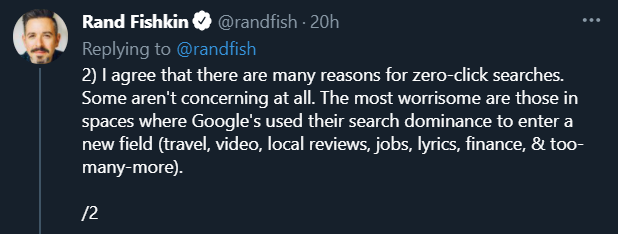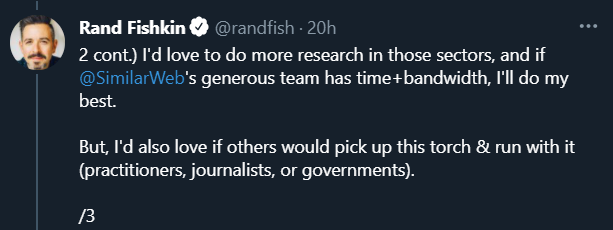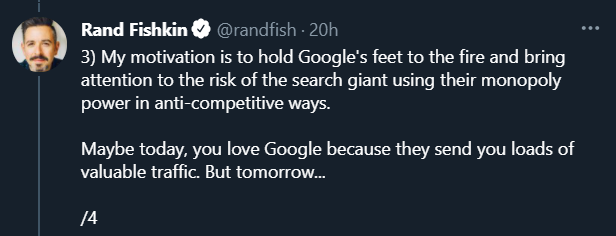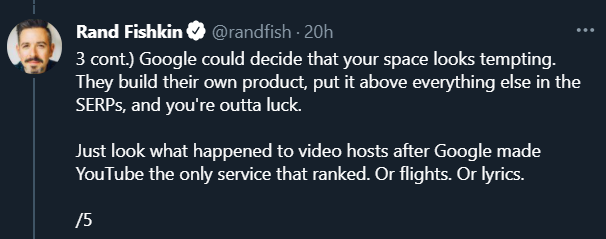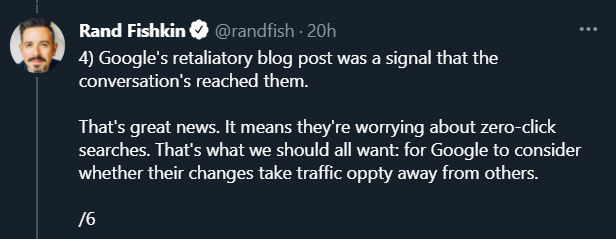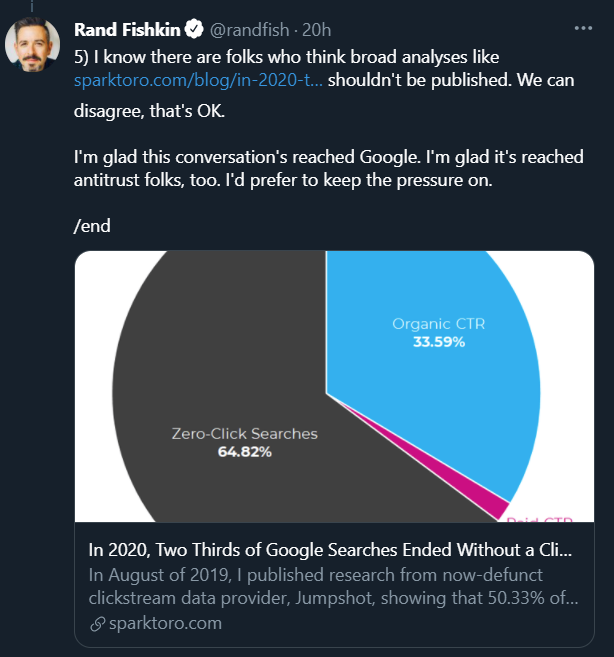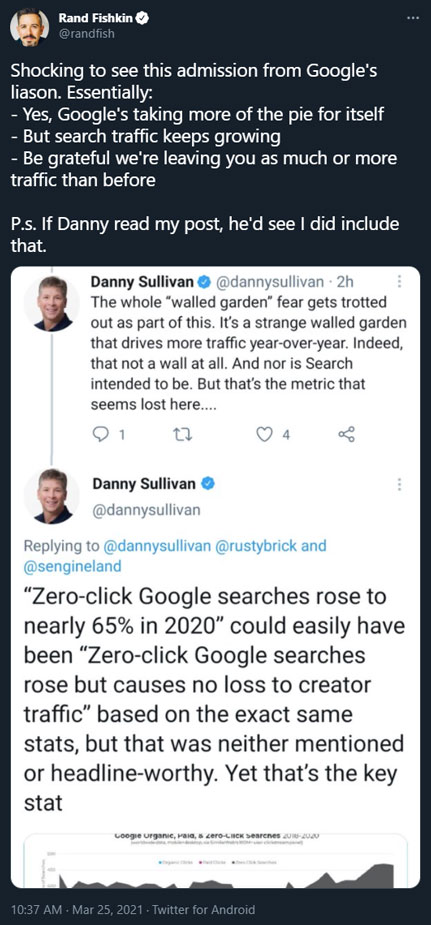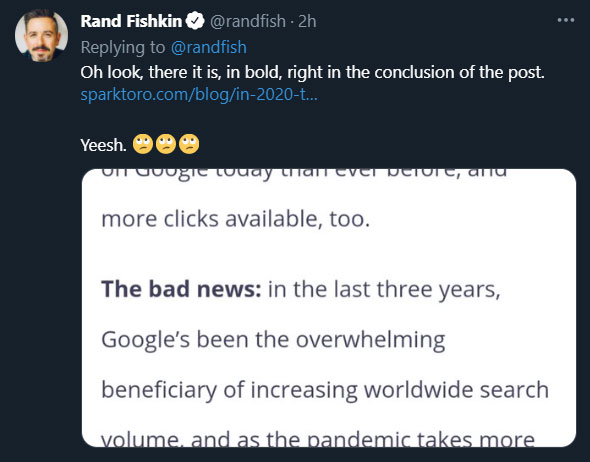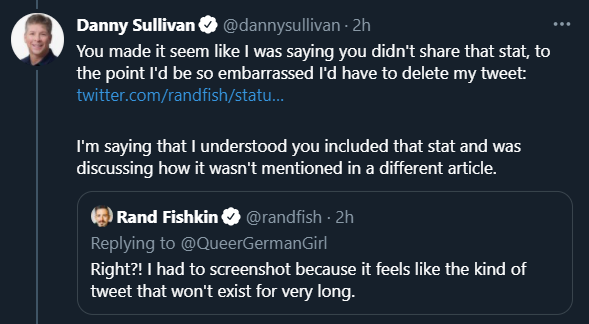Zero-click searches are at the center of quite the debacle. These are defined as searches that do not end up with people clicking on anything in the search results.
SparkToro CEO and former Moz founder Rand Fishkin originally tweeted an article on this topic on March 22nd that quickly became highly controversial in a matter of hours.
The article’s headline? In 2020, Two Thirds of Google Searches Ended Without a Click.
That is a bombshell of a statement. Think about it for a second: two thirds of all Google searches ended in zero-click searches, if this data is to be believed.
What Is the Significance of the Data?
The significance of this data is that almost 65 percent of Google searches ended with zero clicks to the websites featured in their corresponding SERPs.
Of course, Google doesn’t want people to perceive such a statement to be true.
There are also concerns about this data, such as that it’s not considering every possible avenue and may be easy to misinterpret.
But before we get too far into the nitty-gritty details, let’s explain a few things regarding some information about data the sources that were used.
Jumpshot, a data provider that many SEO firms used to track and report on certain types of data in the SEO realm, closed up shop. They were owned by Avast, the anti-virus software company.
Sadly, what happened as a result of Jumpshot closing was that many SEO tools that relied on this data, such as Ahrefs and Semrush, became inaccurate at best and significantly wrong at worst.
With the closing of Jumpshot, those tools—and SEO pros like Fishkin— had to use another provider called SimilarWeb.
As such, Fishkin explained the fact that his data is not an apples to apples comparison, and thus may not be quite as reliable:
The specific highlights from Rand’s data include the following:
- SimilarWeb analyzed ~5.1 trillion Google searches in 2020
- These searches took place on the 100M+ panel of mobile and desktop devices from which SimilarWeb collects clickstream data
- Of those 5.1T searches, 33.59% resulted in clicks on organic search results
- 1.59% resulted in clicks on paid search results
- The remaining 64.82% completed a search without a direct, follow-up click to another web property
- Searches resulting in a click are much higher on desktop devices (50.75% organic CTR, 2.78% paid CTR)
- Zero-click searches are much higher on mobile devices (77.22%)
A Firestorm of Controversy Erupts on Twitter
Quite a number of discussions happened on Twitter after Fishkin published this data.
It got out of control pretty quickly, and Google soon stepped in with their response to the issue.
Their explanation for zero-click searches surrounded the following points (directly from Google’s post):
How people use Search
People use Search to find a wide range of information, and billions of times per day, Google Search sends someone to a website. But not every query results in a click to a website, and there are a lot of very good reasons why:
People reformulate their queries
People don’t always know how to word their queries when they begin searching. They might start with a broad search, like “sneakers” and, after reviewing results, realize that they actually wanted to find “black sneakers.” In this case, these searches would be considered a “zero-click” — because the search didn’t result immediately in a click to a website. In the case of shopping for sneakers, it may take a few “zero-click” searches to get there, but if someone ultimately ends up on a retailer site and makes a purchase, Google has delivered a qualified visitor to that site, less likely to bounce back dissatisfied.
Because this happens so frequently, we offer many features (like “related searches” links) to help people formulate their searches and get to the most helpful result, which is often on a website.
People look for quick facts
People look for quick, factual information, like weather forecasts, sports scores, currency conversions, the time in different locations and more. As many search engines do, we provide this information directly on the results page, drawing from licensing agreements or tools we’ve developed. These results are helpful for users, and part of our ongoing work to make Google Search better every day.
In 2020, for example, we showed factual information about important topics like COVID and the U.S. elections, which generated some of the most interest we’ve ever seen on Search. Our elections results feature was seen billions of times, delivering high-quality information in real time as people awaited the outcome. We also provided factual information about COVID symptoms in partnership with the WHO and local health authorities, making critical information readily accessible and upholding our responsibility to fight against potential misinformation online.
People connect with a business directly
When it comes to local businesses, we provide many ways for consumers to connect directly with businesses through Google Search, many of which don’t require a traditional click. As an example, people might search for business hours, then drive to the store after confirming a location is open. Or they find restaurants on Google and call for information or to place an order, using phone numbers we list. On average, local results in Search drive more than 4 billion connections for businesses every month. This includes more than 2 billion visits to websites as well as connections like phone calls, directions, ordering food and making reservations.
We also help the many local businesses that don’t have their own website. Through Google My Business, businesses can create and manage their own page on Google, and get found online. Each month, Google Search connects people with more than 120 million businesses that don’t have a website.
People navigate directly to apps
Some searches take people directly to apps, rather than to websites. For example, if you search for a TV show, you’ll see links to various streaming providers like Netflix or Hulu. If you have that streaming app on your phone, these links will take you directly into the app. The same is true for many other apps, such as Instagram, Amazon, Spotify and more.
Fishkin had the following retort to Google Search Liaison’s post:
Both Rand Fishkin and Google Search Liaison Danny Sullivan traded a jab or two regarding the conclusions of the data:
Barry Schwartz has said that he has an update coming via Search Engine Land’s newsletter that will set the record straight once and for all:
Barry’s Rant on the Zero-Click Searches Debacle
Please find here our latest update to this saga, with Barry Schwartz discussing his point of view on zero-click searches in his video.
It may be the clickers, maybe it’s not. Maybe the search is something that they did by accident, like I don’t know, they search for a misspelling, and they had to re-refine their search, maybe the people also asked triggered something. There’s just so many reasons why somebody might not click on the search results.
Maybe they did a search for how to spell something, or definition, or what’s the weather? Or what time is it in this location? What are the sports scores from this place, license data and stuff like that? How old is Barack Obama?
This is factual information. Now, of course, Google used to send people to weather sites, Google used to send people to sports sites and sports scores, Google used to send people to definition websites. Now that’s a pattern that’s been happening, but Google wants to solve the answer. Now, there is no right or wrong in this situation. I mean, maybe 65% of all searches don’t lead to a click Exactly.
The data was from Similar Web; I don’t know how accurate that data is. But as any mathematician statistician knows, you can take a data set, chunk it up into different areas, and just make it say whatever you want. That’s the beauty of data. And that’s what politicians have done for years.
Again, it gets us thinking about searcher intent. It gets us thinking about this as marketers, what we should be building for our customers, helping our customers build, that are really useful for the searcher to actually click on your website. You got to think in that way. It’s a different space. We can cry, we can whine about it, honestly, it’s not gonna make any short-term difference, probably won’t make any long-term difference either.
So let’s just focus on what we could do for our customers. And not really complain about that. What’s interesting is Google disputed those claims. I got a nice link, and thankfully, but then I was totally shocked by that I had no clue. But basically, they summarize exactly what I just spoke about, about that dispute.
Overall, I really, really wish Google would provide more data. They don’t have to publish the data in a blog post. We have the data on Google My Business, we know clicks on phone numbers, we know clicks on directions. We know those types of clicks. We know some rich results, types of clicks, we don’t have feature snippet clicks, we don’t have voice data. We don’t have a lot of data.
And I wish Google would provide more data, instead of saying, “Yeah, we provide more website traffic.” It goes both ways. And I think Rand has a very, very important point that he’s making. But at the same time, us as marketers need to think about it as what we have now. And what the trend is, I mean, it’s just gonna get worse.
So we got to think about how we can build websites that are clickable from the Google search results and will always be clickable from the Google search results. And that’s been a challenge. That’s been what we do best and we’ll adapt and we’ll get better at it.”
The Story Continues
Clearly some of Rand’s data hit a nerve over at Google, even prompting a response from their very public Search Liaison.
We do feel that there is more to the story that the data doesn’t reveal, but as SEO professionals ourselves, our skepticism is directed more toward Google’s response than Rand’s. But we also have to take Rand’s analysis with a grain of salt due to the fact that it doesn’t include data from the now-defunct Jumpshot, and thus is not an apples to apples comparison.
We’re primarily skeptical about Google because we have observed them saying one thing, and then another, even when something else entirely also rings true about that very thing. Mixed messages from more than one person at Google occur on a regular basis, especially with SEO-related information.
As much as we love both Rand Fishkin, Danny Sullivan and their influence on the search community, there are still questions to be answered. We do think, however, that both sides still have fair points on this topic that merit further discussion, evaluation, and research.
As always, we will continue reporting on this story as it continues to develop.
Image Credits:
Featured Image: 13_Phunkod / March 2021
All Screenshots: By Author / March 2021


